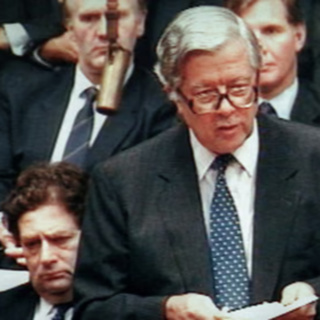
14. Reckless Romanticism, a Touch of Gayness, and Bonfires
The marriage of James VI of Scotland, later James I of England, to Anne of Denmark started off with some romanticism, including a dangerous sea crossing to fetch her home, and it certainly produced a lot of pregnancies (very much a royal couple's duty), though things then rather faded. That's possibly because James wasn't quite as interested in women as the initial gesture suggested. But there was no way he could be openly gay at that time. There were also quite a few conspiracies against him, most famously the 'Gunpowder Plot' in which Guy Fawkes played a major role. That left Britain with its annual bonfire nights, including the burning of the unfortunate Guy in effigy. Not perhaps the most charming of traditions. Illustration: George Villiers, Duke of Buckingham, favourite of James I of England Portrait by Michiel J. van Miereveld Music: Bach Partita #2c by J Bu licensed under an Attribution-NonCommercial-No Derivatives (aka Music Sharing) 3.0 International License http://creativecommons.org/licenses/by-nc-nd/3.0/
23 Tammi 20219min

13. Wise Fool
James I of England (VI of Scotland) had clear ideas of what kingship meant. It meant he'd been chosen by God to run the show and Parliament wasn't going to get in his way. The trouble was, Parliament controlled the money. And James's attitude wasn't going to make any friends there. A fine scholar, he proved himself pretty useless as a politician. No wonder they called him "the wisest fool in Christendom". Illustration: Title page of a King James Bible, lasting legacy of the first Stuart King ©Maharage Don Janaka Dharmasena/123RF.COM Music: Bach Partita #2c by J Bu licensed under an Attribution-NonCommercial-NoDerivatives (aka Music Sharing) 3.0 International License
18 Tammi 20219min

12. Hunting and Hanging
Boy, did it take a long time for James VI of Scotland to get from his proclamation as King of England, down to London to take the throne as James I. Partly that was because he had other things to do on the way down. A spot of hunting, for instance. And hanging a man without due process, not the English way of doing these things, but something of a sign of what was to come with the bright new Stuart dynasty. Well, perhaps not that bright. James VI of Scotland and I of England. ©Jose Georgios Kollidas/123RF.COM Music: Bach Partita #2c by J Bu licensed under an Attribution-NonCommercial-NoDerivatives (aka Music Sharing) 3.0 International License.
13 Tammi 20217min

11. Transition
With no children of her own, what had Elizabeth I done to guarantee a smooth succession after her death? The answer is precious little. Which meant there had to be some clever footwork by her Chief Minister Robert Cecil, son of the William Cecil who had served so ably before, to ensure that the transition went well, peacefully and the way he wanted it. You'll not be surprised to learn that part of "the way he wanted it", was the way that ensured he kept his job. You can tell how that turned out by the illustration, which shows him confirmed in his post, a year later, at an international peace conference with Spain. As well as clever footwork, the death of Elizabeth was followed by exciting hoofwork, as the crazy Robert Carey galloped at breakneck speed northward to bring the good news to James VI of Scotland, soon to be James I of England too. Not that it was that crazy, seeing how well he did out of his adventurous dash (eventually)... The illustration shows the Somerset Conference of 1604, with Secretary of State Robert Cecil at the far right, with writing implements in front of him ©Juan Garcia/123RF.COM Music: Bach Partita #2c by J Bu licensed under an Attribution-NonCommercial-NoDerivatives (aka Music Sharing) 3.0 International License.
8 Tammi 20218min

10. Here today, no heir tomorrow
Elizabeth was the virgin queen. And indeed she had no children, which would be a bit of a problem for when she finally popped her clogs and the survivors had to try to find a way to make the succession to the throne reasonably peaceful. But was she really a virgin? And if she never married, was that down to careful international politics, equally careful national politics, or even the weird experience she had, as a teenager, of having an older man 'romp' with her? The illustration is a portrait of Elizabeth I ©Jose Georgios Kollidas/123RF.COM Music: Bach Partita #2c by J Bu licensed under an Attribution-NonCommercial-NoDerivatives (aka Music Sharing) 3.0 International License.
3 Tammi 20217min

9. Armada - the sequel
England loves stories about its great victory over the Spanish Armada. But it talks far less about its sequel. And, boy, was there a sequel: England's own Armada, against Spain. From England's point of view, it didn't go anything like as well as Spain's attempted invasion. Which probably explains why it's talked about some much less in English schools. The illustration shows a turret from the old fortress in A Coruña (Corunna) ©Jose Angel Astor/123RF.COM Music: Bach Partita #2c by J Bu licensed under an Attribution-NonCommercial-NoDerivatives (aka Music Sharing) 3.0 International License.
29 Joulu 20208min

8. The Armada. And the body of a weak and feeble woman
Spain sent its Armada against Elizabethan England, and the expedition ended in disaster, though far more for its failures of planning and the lousy weather than for anything the English did. Meanwhile, Elizabeth I had a great time when she went down to inspect the militia at Tilbury. Can you imagine? The only woman among 4000 admiring solders. She loved it. And gave an iconic speech to mark the occasion. The illustration shows the Spanish Armada in crescent formation pursued up the Chanelle by the English fleet under Lord Howard of Effingham ©Patrick Guenette/123RF.COM Music: Bach Partita #2c by J Bu licensed under an Attribution-NonCommercial-NoDerivatives (aka Music Sharing) 3.0 International License
24 Joulu 20207min

7. Not Piracy
They may have been preying on ships, attacking them, stealing their cargoes and holding their crews to ransom, but they knew for sure that they weren't pirates. They were loyal English sailors in Queen Elizabeth I's service. After all, she was making money from their victories, and no Queen could possibly be profiting from piracy, could she? Well, the Spanish had no doubts. They were certainly pirates. And they were seriously annoying. Chapter 7 of A History of England is about the seamen of Elizabeth's reign and their exciting acts of derring do (or piracy). The illustration shows the captain of the Spanish galleon Our Lady of the Rosary surrenders to Sir Francis Drake of The Revenge ©petervick167/123RF.COM Music: Bach Partita #2c by J Bu licensed under an Attribution-NonCommercial-NoDerivatives (aka Music Sharing) 3.0 International License.
19 Joulu 20207min






















